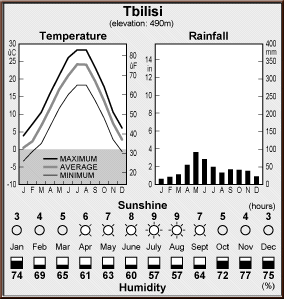CLIMATE
Current Temperature in Tbilisi
 
(See current Weather in
Tbilisi)
Climate
Georgia's climate is affected by subtropical influences from the west
and Mediterranean influences from the east. The Greater Caucasus range moderates local
climate by serving as a barrier against cold air from the north. The relatively small
territory covers different climatic zones, which are determined by distance from the Black
Sea and by altitude. The climatic zones are ranging from humid subtropical to the eternal
snow and glaciers.
West Georgia.
Along the Black Sea coast, from Abkhazia to the Turkish border, and in
the region known as the Kolkhida Lowlands inland from the coast, the dominant subtropical
climate features high humidity and heavy precipitation. Several varieties of palm treet
grow there. Midwinter average temperature here is 5C and the midsummer average is 22C.
East Georgia
The plains of eastern Georgia are shielded from the influence of the
Black Sea by mountains of Likhi that provide a more continental climate. Average
temperature in Summer here is 20-24C, in winter 2-4C. Humidity is lower.
Alpine and highland regions in the east and west, as well as semiarid
region on the Iori Plateau to the southeast have distinct microclimates. Alpine conditions
start at 2,100 meters and above 3,600 meters year-round snow and ice is present..
In general, the best time to visit is from mid April through October,
when days are warm or hot. Tbilisi can be very hot in July and August. Evenings tend to be
cool, even in the summer. The climate varies considerably from east to west; in the
eastern mountains, the weather is dryer and more extreme. The western part of Georgia,
near the Black Sea, has a more moderate climate. No matter when you go, be sure to take
along a sweater for the cool evenings.

The data on average monthly and annual atmospheric temperature for the period of
1881-1960 (in C) gives an idea of the climate in different parts of Georgia
| Region |
Jan |
Feb |
Mar |
Apr |
May |
Jun |
Jul |
Aug |
Sep |
Oct |
Nov |
Dec |
Year |
| Tbilisi |
0.9 |
2.6 |
6.6 |
11.9 |
17.3 |
21.1 |
24.4 |
24.2 |
19.6 |
13.8 |
7.6 |
2.8 |
12.7 |
| West Georgia |
5.2 |
5.8 |
8.4 |
12.9 |
17.9 |
21.0 |
23.2 |
23.6 |
20.5 |
16.4 |
11.5 |
7.5 |
14.5 |
| East Georgia |
0.5 |
1.9 |
5.7 |
11.1 |
16.0 |
19.6 |
22.9 |
23.0 |
18.5 |
13.1 |
7.0 |
2.5 |
11.8 |
| South Georgia |
-2.1 |
-0.8 |
3.0 |
8.4 |
13.6 |
16.8 |
19.8 |
20.1 |
15.8 |
10.2 |
4.5 |
0.0 |
9.1 |
| Mountains |
-0.6 |
-4.6 |
-0.5 |
5.2 |
11.0 |
14.0 |
16.4 |
16.3 |
12.0 |
7.1 |
1.6 |
-4.1 |
5.7 |
| Sea North Coast |
5.8 |
6.7 |
9.3 |
12.7 |
17.2 |
20.8 |
23.5 |
23.8 |
20.5 |
16.6 |
11.6 |
8.4 |
14.7 |
| Sea South Coast |
7.1 |
7.2 |
8.4 |
11.5 |
15.8 |
20.0 |
22.8 |
23.2 |
20.3 |
16.6 |
12.0 |
8.6 |
14.5 |
|
|